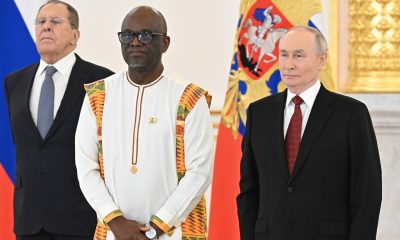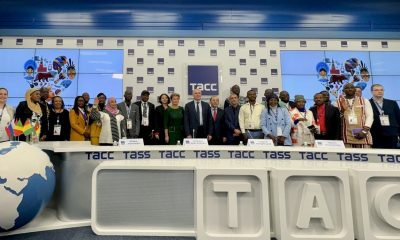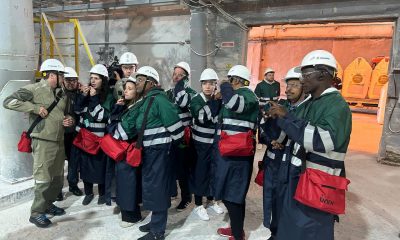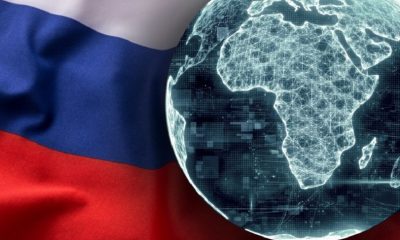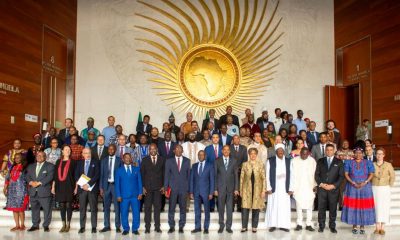World
Russia Shaping its Future Partnership with Africa
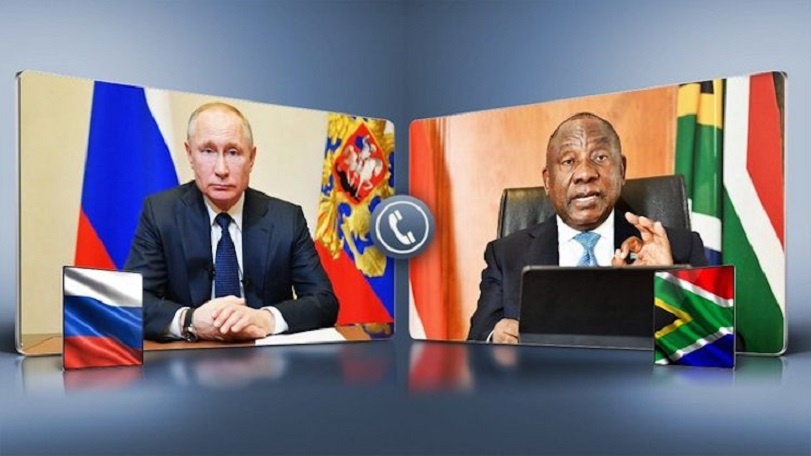
By Kestér Kenn Klomegâh
The second Russia-Africa summit is planned to demonstrate Russia’s stance against Western hegemony and its capitalist domination across Africa, to show Russia’s “non-Western friends” and to further solicit enormous support for its war in Ukraine. On Africa’s side, leaders plan for their traditional deliberations on “no-cost delivery” of grains while the chosen special group of mediators continues to broker expected peace between Russia and Ukraine.
The St. Petersburg gathering is designed to determine the trajectory of Russia’s relations with African countries in the long term. The program includes more than 30-panel sessions and thematic events on the most important issues of interaction between Russia and African countries.
President Vladimir Putin and his South African counterpart Cyril Ramaphosa discussed during their phone conversation in mid-July about the African peace initiative on Ukraine. The African leaders on a Ukraine peace mission will again have an opportunity to talk with Russian President Vladimir Putin on the sidelines of the upcoming Russia-Africa summit in St. Petersburg, Kremlin Spokesman Dmitry Peskov told TASS News Agency.
Diplomatic sources earlier that the African leaders of the Ukraine peace mission from Egypt, Zambia, Comoros, Congo, Senegal, Uganda and South Africa expected to meet with the head of the Russian state before the opening of the Russia-Africa summit in St. Petersburg or during its work.
“The summit’s program is still being prepared. But there will surely be an opportunity to talk on the sidelines,” Peskov said, responding to a question about whether such a meeting was possible in St. Petersburg. As one of the sources told the news agency, the seven African leaders agreed to continue efforts and discuss proposals under the Ukraine peace mission.
A delegation of seven African countries that included the presidents of Zambia, Comoros, Senegal and South Africa, the Egyptian prime minister and representatives of the Republic of Congo and Uganda visited Kyiv on June 16, where it held talks with Ukrainian President Vladimir Zelensky.
Russian Foreign Minister Sergey Lavrov said in an interview with Lenta.ru daily that “the Russian Foreign Ministry is working on opening new embassies in a number of African countries.”
“Following the 1st Russia-Africa Summit in Sochi in 2019, the national leadership adopted decisions on expanding our diplomatic presence in Africa,” Lavrov said. “The Foreign Ministry is working to open new embassies in a number of African countries.”
On 12 July, Addis Ababa hosted a pre-summit roundtable; discussions focused on the prospects for the development of Russia-Africa economic and social partnership relations. “The Russia-Africa summit is an event that plays a key role in the development of relations between Russia and Africa. It is to achieve a whole new level of mutually beneficial partnership capable of meeting the challenges of the 21st century in the shortest possible time,” emphasized Evgeny Terekhin, Ambassador Extraordinary and Plenipotentiary of Russia to Ethiopia.
The digitalization of Africa is attracting particular attention from Russians. We live in a digital world and undoubtedly, the future of civilization lies in the digital economy. For 20 years, digital transformation has been underway in all regions of Russia. Russia has the world’s best digital platforms for B2B, B2C, product labelling and educational services, and Moscow has become the best city in the world in terms of living comfort and digitalization of services offered, according to Igor Morozov, Chairman of the Coordinating Committee for Economic Cooperation with African Countries (AfroCom).
Senator Igor Morozov explained further that “the other cities in the top three are Toronto and Singapore. We certainly have a lot to share with our African partners, especially since they are already prepared for a new experience. The African Continental Free Trade Zone has started operating, and many African countries, including Ethiopia, are creating science and technology parks and IT clusters.”
As always, summit participants are arriving with foreign currency in their pockets or on their credit cards to St. Petersburg. It is a normal situation travelling African leaders with US dollars on their credit cards. Similarly, Russian officials exchange local rubles for foreign currency, for instance travelling to Miami leisure beach, Havana, Cuba or to their popular destination Dubai in the United Arab Emirates. Yet, Russians are the first partisan critics of de-dollarisation.
Everything now relates to colonialism, wraps up with neo-colonial clothes. Discourse on colonialism and neo-colonialism have become fashionable. Unsurprisingly, African migrants’ gruesome death at sea is also attributed to Europeans’ neo-colonialism. And no doubt, the movement of highly-skilled labour from Africa in search of employment opportunities on the global markets. In this case, African leaders primarily must share the blame for their utter failure to smoothly address development questions and to create better conditions at home.
Russia, like Africa, has also witnessed a ‘brain-drain’ these several years; most of its skilled specialists and professionals relocated to the United States, Canada and Europe. Understandably, more than three decades after the Soviet collapse, Russia has few well-trained multipolar-oriented specialists and professionals to work seriously on its diverse policy goals across Africa.
The Russian International Affairs Council, a non-government organisation and policy think-tank, published an opinion article authored by Kirill Babaev – Director of the Institute of Far Eastern Studies of the Russian Academy of Sciences, Professor at the Financial University. He made an excellent analysis of the relations between Russia and Africa.
The article highlighted future perspectives and successes in building political dialogues during the previous years. On the other hand, he was exposed for serious consideration by authorities to some existing obstacles and weaknesses.
Brain drain is seriously affecting Russia. Today the situation has changed radically, according to his assessment. Kirill Babaev pointed out the challenges Russia faces, one of them is “an immense lack of personnel for successful work in Africa” – and further suggested a necessity for putting together a distinctive group of experienced professionals and specialists to work on practical, consistent and effective policy challenges as well as geopolitical tasks with African countries.
In sharp contrast, during pre-summit roundtable discussions held this month, Oleg Ozerov, Head of the Secretariat of the Russia-Africa Partnership Forum, argued that Russia takes an interest in highly skilled specialists from Africa, but has no intention of encouraging any kind of “brain drain” like the West does by attracting and employing them in the United States.
“In other words, it is another form of neocolonialism, or the exploitation of Africa that has been carried out throughout centuries through the slave trade and the pumping of resources, and now it has evolved into ‘brain drain,'” Oleg Ozerov added. “In other words, those people who should boost Africa, transforming it into a new pole of growth. We are convinced that Africa has a vast future and potential, first and foremost, huge human potential in the continent.”
Reports from the World Bank indicated that the United States has the largest African diaspora, which has close-knitted business, educational and cultural links with African countries. This helps to support official efforts in promoting relations with Africa.
The US-Africa trade and commercial relations and engagement through the African Growth and Opportunity Act (AGOA) yields $78.01 billion per year, while, for instance, monetary remittances inflows to sub-Saharan Africa soared 14.1 per cent to $49 billion in 2021. Is that compared to Russia and China?
Beyond remittances, Africa benefits from the input of its diaspora considered very progressive. Ultimately, African leaders consistently engage with their diaspora, those excelling in sports, academia, business, science, technology, engineering and all those other significant sectors that the continent needs to optimise its potential and meet development priorities.
During the second week of July, St. Petersburg hosted Reversed Safari exhibit of contemporary African art, featuring works by 47 African and 14 Russian artists opened to the general public. There were over 300 pieces of art on display, including paintings, sculptures, photographs, and video footage, as well as three large-scale installations created specifically for the event. All exhibit items are devoted to the legacy of the colonial era, how different cultures interact, daily life and the search for identity.
According to Professor Gerrit Olivier, an emeritus professor at Pretoria University and former South African Ambassador to the Russian Federation and Kazakhstan, within the context of the current global changes of the 21st century, Russia is experiencing isolation, but African leaders would visit Moscow to meet Vladimir Putin. Today, Russia’s influence in Africa, despite efforts towards resuscitation, remains marginal. While, given its global status, Russia ought to be active with concrete development projects in Africa as Western Europe, the European Union, America, and China are, it is all but absent, playing a negligible role in Africa.
“These African leaders will realise that there will be no quid pro quo in Moscow, that a weakened Putin can offer nothing and his purpose with this meeting will mainly be to demonstrate support from Africa. This will probably be forthcoming in the form of a repeated ‘non-aligned’ posture (the African warped interpretation, that is), and those leaders presently under the protection of Wagner would no doubt insist on continuation. All this, no doubt, will be used as a propaganda piece against the West!”
Professor David Shinn, a former top U.S. diplomat and now an Adjunct Professor of International Affairs at George Washington University’s Elliot School of International Affairs, discusses a few significant points here relating to the forthcoming summit.
This is an interesting time for Russia to host the Africa summit. The emerging multipolar world, especially Russia’s partnership with China, briefly put Vladimir Putin in a stronger position in Africa vis-à-vis the West. Most African leaders seem to favour the multipolar order. Putin’s invasion of Ukraine significantly disrupted that positive trend for Russia. Just over half of Africa’s governments oppose or are skeptical of Moscow’s engagement in Ukraine while just under half were willing to express a neutral position and Eritrea to express support.
“The mutiny by the Wagner Group has further complicated Russia’s position in Africa and raises serious questions about the strength of its partnership with China. While a small number of autocratic African leaders beholden to the Wagner Group (and Eritrea) remain for the time being firm with Russia, I suspect the mutiny has raised second thoughts with other African leaders who were neutral and strengthened the concerns of those leaders who opposed or were sceptical of the invasion from the beginning,” Professor Shinn wrote further in his email.
According to the academic professor, Vladimir Putin would want to go forward with the Africa summit this month to “prove” to the world that the situation in Russia is back to normal. “But I wonder how enthusiastic most African leaders will be to participate at this time when the future of the Wagner Group in Africa is in doubt, Russia is doing poorly in Ukraine, and Moscow is less able to offer Africa much of tangible value. African attendance at the summit and the substance of the results will be most telling,” Professor Shinn concluded.
Dr Alex Vines, Africa Program Director at Chatham House, a policy think tank, told this author that “the Lavrov visits to Africa this year and Russian diplomacy has been focused at getting African leadership to attend the St Petersburg summit. The number of leaders attending is important for Moscow to show it’s not isolated and Africans still wish to engage with Russia diplomatically.”
Notwithstanding those several initiatives of engaging in the economic sectors and supporting Africa, Russia has its strengths and weaknesses based on history, but the balance is positive in this new world. Whatever African leaders wanted depended on their rational and calculated basis and on their ability to build up multifaceted development-oriented relations with Russia.
At the end of the summit, there would a joint declaration, pre-summit media reports indicated. Several other documents and agreements including those on cooperation in space, anti-terrorist activity and security, as well as economic and humanitarian cooperation. The second Russia-Africa summit and the Economic and Humanitarian Forum will be held in St. Petersburg at the ExpoForum Convention and Exhibition Centre on 27–28 July 2023.
World
Ukraine Reveals Identities of Nigerians Killed Fighting for Russia

By Adedapo Adesanya
The Ukrainian Defence Intelligence (UDI) has identified two Nigerian men, Mr Hamzat Kazeem Kolawole and Mr Mbah Stephen Udoka, allegedly killed while fighting as Russian mercenaries in the war between the two countries ongoing since February 2022.
The development comes after Russia denied knowledge of Nigerians being recruited to fight on the frontlines.
Earlier this week, the Russian Ambassador to Nigeria, Mr Andrey Podyolyshev, said in Abuja that he was not aware of any government-backed programme to recruit Nigerians to fight in the war in Ukraine.
He said if at all such activity existed, it is not connected with the Russian state.
However, in a statement on Thursday, the Ukrainian Defence released photographs of Nigerians killed while defending Russia.
“In the Luhansk region, military intelligence operatives discovered the bodies of two citizens of the Federal Republic of Nigeria — Hamzat Kazeen Kolawole (03.04.1983) and Mbah Stephen Udoka (07.01.1988),” the statement read.
According to the statement, both men served in the 423rd Guards Motor Rifle Regiment (military unit 91701) of the 4th Guards Kantemirovskaya Tank Division of the armed forces of the Russian Federation.
UDI said that they signed contracts with the Russian Army in the second half of 2025 – the deceased Mr Kolawole on August 29 and Mr Udoka on September 28.
“Udoka received no training whatsoever — just five days later, on October 3, he was assigned to the unit and sent to the temporarily occupied territories of Ukraine,” the report read.
It added that no training records for Mr Kolawole have been preserved; however, it is highly likely that he also received no military training, but his wife and three children remain in Nigeria.
Both Nigerians, the report added, were killed in late November during an attempt to storm Ukrainian positions in the Luhansk region.
“They never engaged in a firefight — the mercenaries were eliminated by a drone strike,” UDI stated, warning foreign citizens against travelling to the Russian Federation or taking up any work on the territory of the “aggressor state”.
“A trip to Russia is a real risk of being forced into a suicide assault unit and, ultimately, rotting in Ukrainian soil,” the statement read.
In an investigation earlier this month, CNN reported that hundreds of African men have been enticed to fight for Russia in Ukraine with the promise of civilian jobs and high salaries. However, the media organisation uncovered that they are being deceived or sent to the front lines with little combat training.
CNN said it reviewed hundreds of chats on messaging apps, military contracts, visas, flights and hotel bookings, as well as gathering first-hand accounts from African fighters in Ukraine, to understand just how Russia entices African men to bolster its ranks.
World
Today’s Generation of Entrepreneurs Value Flexibility, Autonomy—McNeal-Weary

By Kestér Kenn Klomegâh
The Young African Leaders Initiative (YALI) is the United States’ signature step to invest in the next generation of African leaders. Since its establishment in 2010 by Obama administration, YALI has offered diverse opportunities, including academic training in leadership, governance skills, organizational development and entrepreneurship, and has connected with thousands of young leaders across Africa. This United States’ policy collaboration benefits both America and Africa by creating stronger partnerships, enhancing mutual prosperity, and ensuring a more stable environment.
In our conversation, Tonya McNeal-Weary, Managing Director at IBS Global Consulting, Inc., Global Headquarters in Detroit, Michigan, has endeavored to discuss, thoroughly, today’s generation of entrepreneurs and also building partnerships as a foundation for driving positive change and innovation in the global marketplace. Here are the excerpts of her conversation:
How would you describe today’s generation of entrepreneurs?
I would describe today’s generation of entrepreneurs as having a digital-first mindset and a fundamental belief that business success and social impact can coexist. Unlike the entrepreneurs before them, they’ve grown up with the internet as a given, enabling them to build global businesses from their laptops and think beyond geographic constraints from day one. They value flexibility and autonomy, often rejecting traditional corporate ladders in favor of building something meaningful on their own terms, even if it means embracing uncertainty and financial risk that previous generations might have avoided.
And those representing the Young African Leaders Initiative, who attended your webinar presentation late January 2026?
The entrepreneurs representing the Young African Leaders Initiative are redefining entrepreneurship on the continent by leveraging their unique perspectives, cultural heritage, and experiences. Their ability to innovate within local contexts while connecting to global opportunities exemplifies how the new wave of entrepreneurs is not confined by geography or conventional expectations.
What were the main issues that formed your ‘lecture’ with them, Young African Leaders Initiative?
The main issues that formed my lecture for the Young African Leaders Initiative were driven by understanding the importance of building successful partnerships when expanding into the United States or any foreign market. During my lecture, I emphasized that forming strategic alliances can help entrepreneurs navigate unfamiliar business environments, access new resources, and foster long-term growth. By understanding how to establish strong and effective partnerships, emerging leaders can position their businesses for sustainable success in global markets. I also discussed the critical factors that contribute to successful partnerships, such as establishing clear communication channels, aligning on shared goals, and cultivating trust between all parties involved. Entrepreneurs must be proactive in seeking out partners who complement their strengths and fill gaps in expertise or resources. It is equally important to conduct thorough due diligence to ensure that potential collaborators share similar values and ethical standards. Ultimately, the seminar aimed to empower YALI entrepreneurs with practical insights and actionable strategies for forging meaningful connections across borders. Building successful partnerships is not only a pathway to business growth but also a foundation for driving positive change and innovation in the global marketplace.
What makes a ‘leader’ today, particularly, in the context of the emerging global business architecture?
In my opinion, a leader in today’s emerging global business architecture must navigate complexity and ambiguity with a fundamentally different skill set than what was previously required. Where traditional leadership emphasized command-and-control and singular vision, contemporary leaders succeed through adaptive thinking and collaborative influence across decentralized networks. Furthermore, emotional intelligence has evolved from a soft skill to a strategic imperative. Today, the effective modern leader must possess deep cross-cultural intelligence, understanding that global business is no longer about exporting one model worldwide but about genuinely integrating diverse perspectives and adapting to local contexts while maintaining coherent values.
Does multinational culture play in its (leadership) formation?
I believe multinational culture plays a profound and arguably essential role in forming the kind of leadership required in today’s global business environment. Leaders who have lived, worked, or deeply engaged across multiple cultural contexts develop a cognitive flexibility that’s difficult to replicate through reading or training alone. More importantly, multinational exposure tends to dismantle the unconscious certainty that one’s own way of doing things is inherently “normal” or “best.” Leaders shaped in multicultural environments often develop a productive discomfort with absolutes; they become more adept at asking questions, seeking input, and recognizing blind spots. This humility and curiosity become strategic assets when building global teams, entering new markets, or navigating geopolitical complexity. However, it’s worth noting that multinational experience alone doesn’t automatically create great leaders. What matters is the depth and quality of cross-cultural engagement, not just the passport stamps. The formation of global leadership is less about where someone has been and more about whether they’ve developed the capacity to see beyond their own cultural lens and genuinely value differences as a source of insight rather than merely tolerating them as an obstacle to overcome.
In the context of heightening geopolitical situation, and with Africa, what would you say, in terms of, people-to-people interaction?
People-to-people interaction is critically important in the African business context, particularly as geopolitical competition intensifies on the continent. In this crowded and often transactional landscape, the depth and authenticity of human relationships can determine whether a business venture succeeds or fails. I spoke on this during my presentation. When business leaders take the time for face-to-face meetings, invest in understanding local priorities rather than imposing external agendas, and build relationships beyond the immediate transaction, they signal a different kind of partnership. The heightened geopolitical situation actually makes this human dimension more vital, not less. As competition increases and narratives clash about whose model of development is best, the businesses and nations that succeed in Africa will likely be those that invest in relationships characterized by reciprocity, respect, and long-term commitment rather than those pursuing quick wins.
How important is it for creating public perception and approach to today’s business?
Interaction between individuals is crucial for shaping public perception, as it influences views in ways that formal communications cannot. We live in a society where word-of-mouth, community networks, and social trust areincredibly important. As a result, a business leader’s behavior in personal interactions, their respect for local customs, their willingness to listen, and their follow-through on commitments have a far-reaching impact that extends well beyond the immediate meeting. The geopolitical dimension amplifies this importance because African nations now have choices. They’re no longer dependent on any single partner and can compare approaches to business.
From the above discussions, how would you describe global business in relation to Africa? Is it directed at creating diverse import dependency?
While it would be too simplistic to say global business is uniformly directed at creating import dependency, the structural patterns that have emerged often produce exactly that outcome, whether by design or as a consequence of how global capital seeks returns. Global financial institutions and trade agreements have historically encouraged African nations to focus on their “comparative advantages” in primary commodities rather than industrial development. The critical question is whether global business can engage with Africa in ways that build productive capacity, transfer technology, develop local talent, and enable countries to manufacture for themselves and for export—or whether the economic incentives and power irregularities make this structurally unlikely without deliberate policy intervention.
World
Russia Expands Military-Technical Cooperation With African Partners

By Kestér Kenn Klomegâh
Despite geopolitical complexities, tensions and pressure, Russia’s military arms and weaponry sales earned approximately $15 billion at the closure of 2025, according to Kremlin report. At the regular session, chaired by Russian President Vladimir Putin on Jan. 30, the Commission on Military and Technical Cooperation with Foreign Countries analyzed the results of its work for 2025, and defined plans for the future.
It was noted that the system of military-technical cooperation continued to operate in difficult conditions, and with increased pressure from the Western countries to block business relations with Russia. The meeting, however, admitted that export contracts have generally performed sustainably. Russian military products were exported to more than 30 countries last year, and the amount of foreign exchange exceeded $15 billion.
Such results provide an additional opportunity to direct funds to the modernization of OPC enterprises, to the expansion of their production capacities, and to advanced research. It is also important that at these enterprises a significant volume of products is civilian products.
The Russian system of military-technical cooperation has not only demonstrated effectiveness and high resilience, but has created fundamental structures, which allow to significantly expand the “geography” of supplies of products of military purpose and, thus strengthen the position of Russia’s leader and employer advanced weapons systems – proven, tested in real combat conditions.
Thanks to the employees of the Federal Service for Military Technical Cooperation and Rosoboronexport, the staff of OPC enterprises for their good faith. Within the framework of the new federal project “Development of military-technical cooperation of Russia with foreign countries” for the period 2026-2028, additional measures of support are introduced. Further effective use of existing financial and other support mechanisms and instruments is extremely important because the volumes of military exports in accordance with the 2026 plan.
Special attention would be paid to the expansion of military-technological cooperation and partnerships, with 14 states already implementing or in development more than 340 such projects.
Future plans will allow to improve the characteristics of existing weapons and equipment and to develop new promising models, including those in demand on global markets, among other issues – the development of strategic areas of military-technical cooperation, and above all, with partners on the CIS and the CSTO. This is one of the priority tasks to strengthen both bilateral and multilateral relations, ensuring stability and security in Eurasia.
From January 2026, Russia chairs the CSTO, and this requires working systematically with partners, including comprehensive approaches to expanding military-technical relations. New prospects open up for deepening military-technical cooperation and with countries in other regions, including with states on the African continent. Russia has been historically strong and trusting relationships with African countries. In different years even the USSR, and then Russia supplied African countries with a significant amount of weapons and military equipment, trained specialists on their production, operation, repair, as well as military personnel.
Today, despite pressure from the West, African partners express readiness to expand relations with Russia in the military and military-technical fields. It is not only about increasing supplies of Russian military exports, but also about the purchase of other weapons, other materials and products. Russia has undertaken comprehensive maintenance of previously delivered equipment, organization of licensed production of Russian military products and some other important issues. In general, African countries are sufficient for consideration today.
-

 Feature/OPED6 years ago
Feature/OPED6 years agoDavos was Different this year
-
Travel/Tourism10 years ago
Lagos Seals Western Lodge Hotel In Ikorodu
-

 Showbiz3 years ago
Showbiz3 years agoEstranged Lover Releases Videos of Empress Njamah Bathing
-

 Banking8 years ago
Banking8 years agoSort Codes of GTBank Branches in Nigeria
-

 Economy3 years ago
Economy3 years agoSubsidy Removal: CNG at N130 Per Litre Cheaper Than Petrol—IPMAN
-

 Banking3 years ago
Banking3 years agoSort Codes of UBA Branches in Nigeria
-

 Banking3 years ago
Banking3 years agoFirst Bank Announces Planned Downtime
-

 Sports3 years ago
Sports3 years agoHighest Paid Nigerian Footballer – How Much Do Nigerian Footballers Earn


